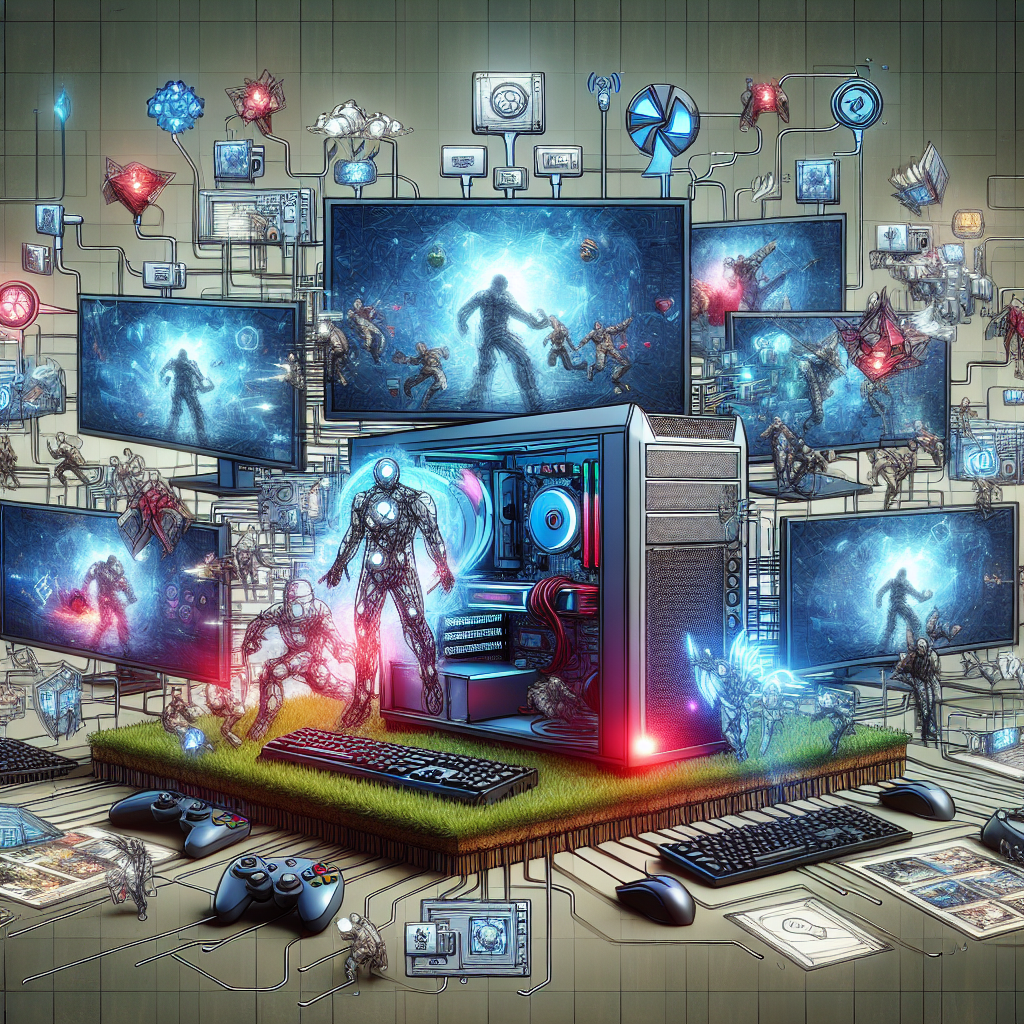Gaming PCs are not just designed for playing games; they are powerful machines capable of handling multiple tasks simultaneously. But how exactly do they manage to keep up with the high demands of gaming while juggling other applications? This comprehensive guide delves into the intricate mechanism by which gaming PCs handle multitasking during gameplay.
Understanding the Role of Hardware in Multitasking
The main components that enable seamless multitasking in gaming PCs include the Central Processing Unit (CPU), Graphics Processing Unit (GPU), and Random Access Memory (RAM). Each plays a vital role in handling different aspects of gaming and multitasking.
| Component | Function |
|---|---|
| CPU | Handles general computing tasks and game logic processing |
| GPU | Manages graphics rendering and related tasks |
| RAM | Stores data temporarily for quick access by CPU and GPU |
Central Processing Unit (CPU)
The CPU is the brain of the computer. Modern gaming CPUs have multiple cores and threads, enabling them to handle numerous tasks concurrently. Each core can process its own set of instructions, which is crucial for multitasking. For example, one core can handle the game’s logic while another processes background tasks like streaming software.
Importance of Multi-Core CPUs
In gaming PCs, multi-core CPUs are a standard. A quad-core processor is often considered the minimum for effective multitasking, but most high-end gaming rigs use hex-core or even octa-core processors. These multiple cores allow for parallel processing, significantly enhancing multitasking capabilities.
Graphics Processing Unit (GPU)
The GPU is specialized for handling the graphical aspects of gaming. It offloads rendering tasks from the CPU, allowing the latter to focus on other operations. Advanced GPUs come with their own memory (VRAM), which helps in storing temporary data for quick access, further improving multitasking efficiency.
Dedicated vs. Integrated GPUs
Dedicated GPUs are almost a necessity for gaming PCs, as they provide superior performance compared to integrated GPUs. Integrated GPUs share resources with the CPU, which can hinder both gaming and multitasking performance.
Random Access Memory (RAM)
RAM plays a critical role in multitasking by storing data that the CPU and GPU may need to access quickly. More RAM means more data can be stored for immediate access, reducing the need for the system to fetch information from slower storage devices.
Recommended RAM for Gaming
While 8GB of RAM is often considered the minimum requirement for gaming, 16GB is recommended for improved multitasking. For hardcore gamers and streamers, 32GB or more can provide an even smoother experience.
Operating System and Software Optimization
The operating system (OS) and various optimizations also play a critical role in handling multitasking. Modern OS like Windows 10 and 11 are designed to efficiently manage system resources, ensuring that high-priority tasks receive the necessary allocation of CPU, GPU, and RAM resources.
Game Mode and Priority Management
Operating systems often come with features like Game Mode, which prioritizes system resources for gaming. Similarly, users can manually adjust the priority of different tasks through task management tools, ensuring that critical applications receive sufficient resources.
SSD vs. HDD
The type of storage can also affect multitasking capabilities. Solid State Drives (SSD) offer faster read and write speeds compared to Hard Disk Drives (HDD). This means quicker load times and an overall snappier performance, which can be crucial when running multiple applications simultaneously.
NVMe SSDs for Superior Performance
NVMe (Non-Volatile Memory Express) SSDs offer even greater speeds than traditional SATA SSDs. These are highly recommended for gaming PCs to ensure the best possible multitasking experience.
Network Considerations
If you’re multitasking with online activities, network speed and stability are crucial. A high-speed internet connection ensures smooth online gameplay while also allowing for activities like streaming, downloading updates, or communicating via VoIP without lag.
Wired vs. Wireless Connections
While modern Wi-Fi standards offer high speeds, wired connections (like Ethernet) are generally more stable and offer lower latency. For the best multitasking experience, especially in online gaming, a wired connection is recommended.
The Future of Gaming PCs and Multitasking
With advancements in technology, the multitasking capabilities of gaming PCs are continually improving. Future innovations in CPUs, GPUs, and RAM, as well as new storage technologies and faster internet speeds, will further enhance multitasking experiences.
AI and Machine Learning Enhancements
Future gaming PCs may also leverage AI and machine learning to dynamically adjust resource allocation based on real-time needs, providing an even more seamless multitasking experience.
In conclusion, gaming PCs handle multitasking during gameplay through a combination of powerful hardware, advanced software optimizations, and high-speed network considerations. As technology advances, these capabilities will continue to improve, making multitasking smoother and more efficient.

